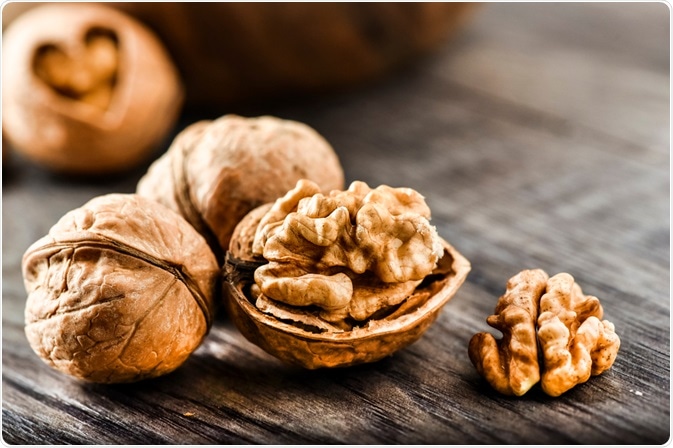buy online amitriptyline pharm support group without prescription

https://medicineball-exercises.com/top/buspar-side-effects-men/
Tree nuts, including walnuts, are dense in nutrients and rich in unsaturated fats. Epidemiological studies have found the consumption of such nuts to be associated with a variety of beneficial health outcomes.

Walnuts and the cardiovascular system
Research has found that consuming walnuts alongside a diet low in saturated fats may reduce the likelihood of developing cardiovascular disease (CVD). One particular study investigated the impact of replacing a proportion of the participants’ daily saturated fat intake with walnuts.
When consumed in addition to a lower overall amount of saturated fat, participants’ central blood pressure was lowered. Central pressure is the overall pressure exerted onto the organs, including the heart. The measurement of such pressure enables practitioners to gauge the likelihood of a person developing CVD.
Similar research has demonstrated that the consumption of walnuts may reduce blood pressure in response to stress exposure and at rest. The researchers examined the effects of walnut consumption in 22 adults with elevated low-density lipoprotein, otherwise known as bad cholesterol. The participants consumed predetermined diets over six weeks.
Those that consumed walnut and walnut oil in their diets showed reduced blood pressure at rest and when exposed to stress. Based on this, it is argued that diets containing walnuts may help our bodies better cope to stress.
Walnuts and breast cancer
The consumption of walnuts has been linked to the suppression of breast cancer growth . Specifically, those who consumed two ounces of walnuts per day over two weeks showed substantially altered tumor gene expression in those with confirmed breast cancer.
As part of the clinical trial, women with breast cancer had biopsies of their lumps pre-intervention and-post-intervention. After the consumption of the walnuts, the results showed that the expression of 456 genes was changed. This work built upon similar research, demonstrating that eating walnuts slowed the rate of growth of cancerous tumors and reduced the onset of breast tumors in mice.
Walnuts and diabetes
An epidemiological study has found that those who consume walnuts have approximately half the risk of developing type 2 diabetes compared to those that did not consume nuts. The study reported that the average daily intake of walnuts was 1.5 tablespoons. However, increasing daily walnut consumption twofold was linked to a 47% lower prevalence of type 2 diabetes irrespective of body mass index, gender, age, race, or activity levels.
The research has also shown that the consumption of nuts, such as walnuts, may be beneficial for improving heart health and overall cognitive function.
Walnuts and cognitive function
Walnuts’ composition of micronutrients, phytosterols, linoleic acid and polyphenolics are associated with improved cognitive function. Specifically, it has been found that dietary supplementation of walnuts can improve motor function, memory and cognition in animals. In humans, increasing general nut intake and walnut intake has been shown to improve cognition in older adults.
Anti-inflammatory properties
Nuts are suggested to boast anti-inflammatory properties due to having a high concentration of phenolic compounds. However, walnuts, in particular, are considered to be more anti-inflammatory in comparison to other tree nuts.
Firstly, research has shown walnuts to contain significant amounts of alpha-linolenic acid – often referred to as an anti-inflammatory fatty acid. Furthermore, walnuts are dense in ellagic acid, which has been shown to have similar benefits in research.
Nutritional benefits of walnuts
Walnuts are considered to be a great source of polyunsaturated fat, approximately 13 grams per ounce, as well as omega-3 fatty acids. Diets containing omega-3 fatty acids, in particular, are associated with the reduction of low-density lipoproteins. Additionally, walnuts are a rich source of antioxidants and fiber.
Despite their proposed benefits, researchers suggest issues regarding general nut consumption. There are conflicting studies on whether nut intake is associated with weight gain or weight loss. Nuts are high in calories and fat, so they should replace other sources of fat and calories when added to the diet.
Sources
Tindall, A. M., Petersen, K. S., Skulas-Ray, A. C., Richter, C. K., Proctor, D. N., & Kris-Etherton, P. M. (2019). Replacing Saturated Fat with Walnuts or Vegetable Oils Improves Central Blood Pressure and Serum Lipids in Adults at Risk for Cardiovascular Disease: A Randomized Controlled-Feeding Trial. Journal of the American Heart Association. DOI: 10.1161/JAHA.118.011512
Hardman, W. E., Primerano, D. A., Legenza, M. T., Morgan, J., Fan, J., & Denvir, J. (2019). Dietary walnut altered gene expressions related to tumor growth, survival and metastasis in breast Cancer patients: A pilot clinical trial. Nutrition Research. DOI: 10.1016/j.nutres.2019.03.004
West, S. G., Krick, A. L., Klein, L. C., Zhao, G., Wojtowicz T. F., McGuiness, M., Bagshaw, D. M., … Wagner, P. (2013). Effects of Diets High in Walnuts and Flax Oil on Hemodynamic Responses to Stress and Vascular Endothelial Function. Journal of the American College of Nutrition. DOI:10.1080/07315724.2010.10719898
Poulose, S. M., Miller, M. G., & Shukitt-Hale, B. (2014). Role of Walnuts in Maintaining Brain Health with Age. American Society for Nutrition. DOI: 10.3945/jn.113.184838
Further Reading
- All Diet Content
- Low Calorie and Very Low Calorie Diets
- Diabetic Diet
- DASH Diet for High Blood Pressure
- High Protein Diet
Last Updated: Dec 13, 2019
Source: Read Full Article